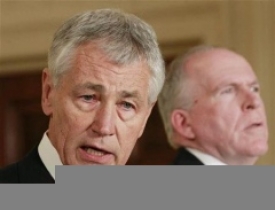
U.S. President Barack Obama's nominee for Secretary of Defense, former Senator Chuck Hagel (L), stands next to counterterrorism adviser John Brennan (R), the nominee for CIA Director, at the White House in Washington January 7, 2013.
Photo: Reuters
The year was 1982. In Washington D.C., the political appointee in charge of the U.S. Veterans Administration was unimpressed by vets who wondered whether the illnesses they suffered were linked to exposure to Agent Orange in Vietnam. To him, these vets were “greedy,” and the effects of dioxin like “a little teenage acne.” Today, we know better.
Back then, the VA chief’s top deputy was furious. As a foot soldier, Chuck Hagel had earned scars and two Purple Hearts. He’d come home, achieved success in business, and accepted the No. 2 VA job after helping Ronald Reagan become president. He resigned his VA post in protest.
Hagel would go on to be elected to two terms in the U.S. Senate and is now President Obama’s nominee as the next Secretary of Defense. He would be the first combat-tested enlisted man to rise to that role, while a fellow veteran of what the Vietnamese call “the American War,” Sen. John Kerry, is poised to become the next U.S. Secretary of State. Two men whose lives were shaped by the brutal, bloody waste of that conflict could have a significant impact on U.S. foreign policy – and improve relations between the U.S. and Vietnam.
Chuck Searcy certainly thinks so. Searcy, like Hagel, was an enlisted man during the Vietnam War, serving in Army intelligence in Saigon. Like Kerry, Searcy returned to America and became a leader of anti-war protests. Hagel returned to holding the belief that the cause was noble – an opinion that would change with time.
Many of Vietnam’s best American friends today are men who once worked to kill the Vietnamese. Sen. John McCain, whose jet fighter crashed in Truc Bach Lake before he spent years as a POW, was President Clinton’s key ally in normalizing U.S. relations with Vietnam in 1995.
Not much later Searcy would return to Vietnam as a representative of the Vietnam Veterans Memorial Fund, best known for erecting a memorial wall on the Washington Mall etched with the more than 58,000 names of Americans who died in the war. In Vietnam Searcy, who now represents the Humpty Dumpty Foundation, has continued his anti-war work, laboring to eradicate the stubborn toxic stain of Agent Orange and tons of unexploded ordnance (UXOs).
Despite the documented successes of Project Renew in Quang Tri province, UXOs still kill and maim people with regularity. Progress has been lethally slow, but it has been made. Today, the U.S. is at long last funding efforts to clean up dioxin hot spots in Danang and near Ho Chi Minh City. But the U.S. government’s contribution to UXO removal, Searcy says, is “pathetic” – just $3.5 million per year. “It’s an embarrassment,” he says.
Could Hagel and Kerry encourage the U.S. to do more? “Absolutely,” Searcy says. “Absolutely.”
Another prominent veteran, Sen. James Webb, has expressed strong support of Vietnam’s territorial rights around the Truong Sa islands. With President Obama placing a larger emphasis on Asia, Kerry and Hagel figure to be heard on such significant issues.
As men who know war in an intimate term, Obama’s preferred advisers are sharp contrasts from the armchair warriors who surrounded President Bush. Vice President Dick Cheney, Secretary of Defense Donald Rumsfeld and others pushed for war in Iraq shortly after the 9/11 terrorist attack – even though the attack had no connection to Iraq.
With the exception of Secretary of State Colin Powell, Bush’s brain trust knew the war with Vietnam only second hand and seemed to see war as a bold move on the geopolitical chessboard. Hagel, though he voted in support of the Iraq invasion, increasingly took a dim view of his fellow Republicans. Their eagerness to send thousands of troops to kill and perhaps to die for their objectives prompted critics to label them “chicken hawks.” Powell, by no means a chicken hawk, would step down after one term as Secretary of State and later cross party lines to endorse Obama for president – and Obama had opposed the Iraq invasion from the start.
Hagel is said to be a great admirer of America’s President Eisenhower, a World War II hero who was so wary of militarism that he warned of the rise of “the military-industrial complex.” Today, as the world’s only superpower, the U.S. spends more money on the military than the next ten or 15 nations combined, depending on the calculation. Hagel has complained about the “bloated” Pentagon budget – one of the chicken hawks, who put two wars on the nation’s credit card, worrying he’ll be happy to trim billions from the budget to restore fiscal sanity. They really don’t like Hagel at all – and that’s why he’s a good pick for the job.
Scott Harris
Source: tuoitrenews.vn






